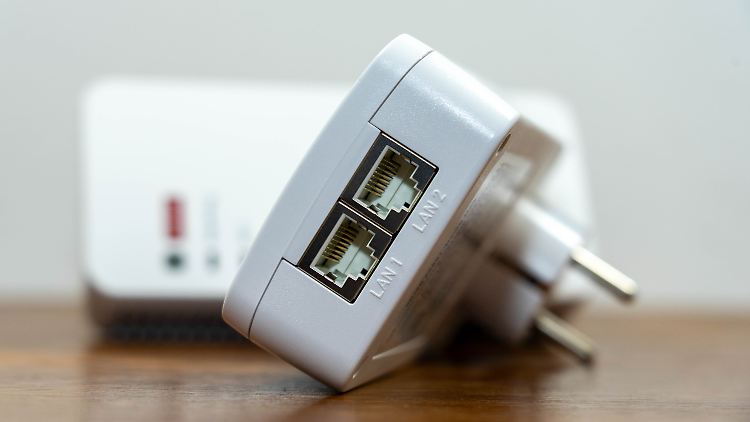The Fritz!Powerline 1240 AX is intended to expand the network of a Fritzbox easily but effectively via power lines. The adapter supports, among other things, the modern and fast WLAN standard Wifi 6. ntv.de has tested how well the device works in practice.
If the router’s WiFi is not enough to reach every corner of an apartment, you can expand the network with additional devices. For short distances, radio repeaters are usually the ideal solution; longer distances are better covered by powerline adapters that use existing power lines.
AVM has now introduced the Fritz! Powerline 1240 AX, which costs around 170 euros, the first partner for its Fritz boxes that can also transmit in Wifi 6. For fast transmission between router and adapter, it uses all three wires of power cables (2×2-MIMO). In the practical test, the Fritz!Powerline 1240 AX proves to be uncomplicated and functional, but cannot meet very high expectations.
Quick and easy to put into operation
The installation is very easy, as promised by AVM. The Fritz!Powerline 1240 AX comes in a set with a Fritz!Powerline 1210. This adapter is plugged into a socket near the Fritzbox and connected to the router using a LAN cable. You first plug in the 1240 AX in the immediate vicinity and wait until the powerline LED lights up steadily green. You can then connect the adapter in the room that is to be integrated into the network.
Ideally, this happens in a mesh network. In principle, this means that the WLAN is called the same everywhere and connected devices are automatically transferred to the strongest transmitter. Users do not have to change networks. To set up this mode, you only have to press one button on the Fritzbox and adapter.
Best in a mesh composite
This worked without any problems in the practical test, as described in the quick instructions provided. If you want to create your own network with the Fritz! Powerline 1240 AX, you can do this almost as easily via the adapter’s user interface (you can also access it from the start menu of the Fritzbox by clicking on its entry.
In order to connect devices, the adapter has two Gigabit LAN ports, which can support 1200 megabits per second (Mbit/s) under ideal conditions. According to the contract, the Internet connection used in the test (FTTB) offers up to 1800 Mbit/s. Using the Federal Network Agency’s desktop application “Broadband Measurement”, ntv.de measured around 950 Mbit/s in download and 120 Mbit/s in upload when connected to a notebook directly via LAN cable.
Practical test


The adapter has two Gigabit LAN ports.
(Photo: kwe)
In practice, the data rates actually achieved are generally much lower, especially with powerline connections. This is not only due to the distance that has to be covered over power lines, but also due to interference. They often cause other electrical devices that are on the same home power network. Multiple sockets, distribution boxes or FI circuit breakers are also data brakes.
In the test, the Fritz!Powerline 1240 AX was plugged in about 30 meters from the Fritzbox, where it was just outside the wireless range of the router. The adapter had a double wall socket for itself, the refrigerator, dishwasher and other everyday appliances remained connected to the network.
No turbo, but fast connections
Using a LAN cable, ntv.de recorded an average download speed of just under 130 Mbit/s, while uploads were about the same speed at 129 Mbit/s. The WLAN connection from around 50 centimeters away with a Wifi 6-capable device reached 104 and 109 Mbit/s.
This is significantly less than measured directly on the Fritzbox, but the values are good and enable fast internet experiences. To enjoy videos in 4K quality on a streaming service, you usually only need 25 Mbit/s, and definitely not more than 50 Mbit/s.
Not much more is possible even with 5 GHz
The practical test took place in a densely populated environment in a multi-story house where there is a lot of interference from other networks and network devices. The longer 2.4 gigahertz band is particularly vulnerable. WLAN with 5 gigahertz (GHz) has a shorter range, but is significantly less disruptive and also enables higher data rates. However, the Fritz!Powerline 1240 AX only operates in the 2.4 GHz band.
On the one hand, this is a shame, as even higher transmission speeds would be possible with 5 GHz. On the other hand, Wifi 6 also enables more stable connections for many devices on the network, which at least partially compensates for the disadvantage. The comparison with data rates achieved over LAN also shows that the difference would probably be relatively small. For most devices in the so-called Internet of Things, the absence of 5 GHz doesn’t matter anyway, since refrigerators, WLAN speakers, etc. usually only use the 2.4 GHz band.
The low power consumption of the adapter set is pleasing. According to AVM, the Fritz!Powerline 1240 AX has an average power consumption of 6 watts, the 1210 2.5 watts. The values measured by ntv.de were slightly lower, especially on the 1240 AX.
Conclusion
The Fritz!Powerline 1240 AX does a good job. It is quick to set up and enables fast Internet connections even in areas that are far away from the router. The fact that WLAN connections only come about via 2.4 GHz is not a problem in most applications; in modern households, Wifi 6 could be more important.
Often one or the other doesn’t matter. Then the Fritz!Powerline 1240E, for example, is available in a starter set for around 140 euros. If you want 5 GHz and Wifi 5 (AC) is sufficient, the Fritz! Powerline 1260 is a solution that costs around 150 euros as a duo.


